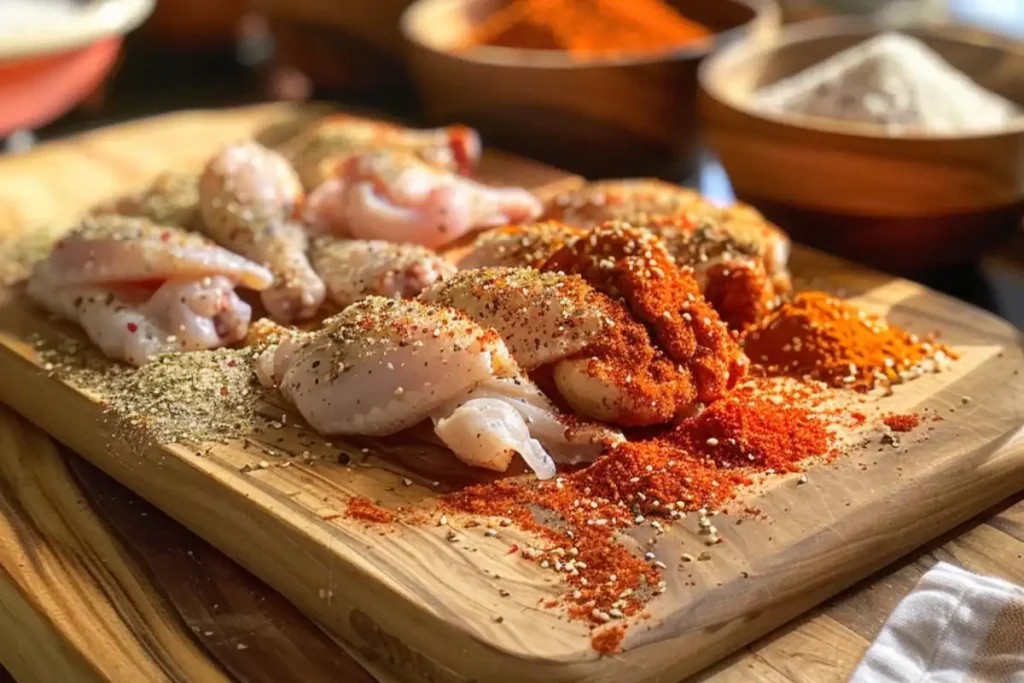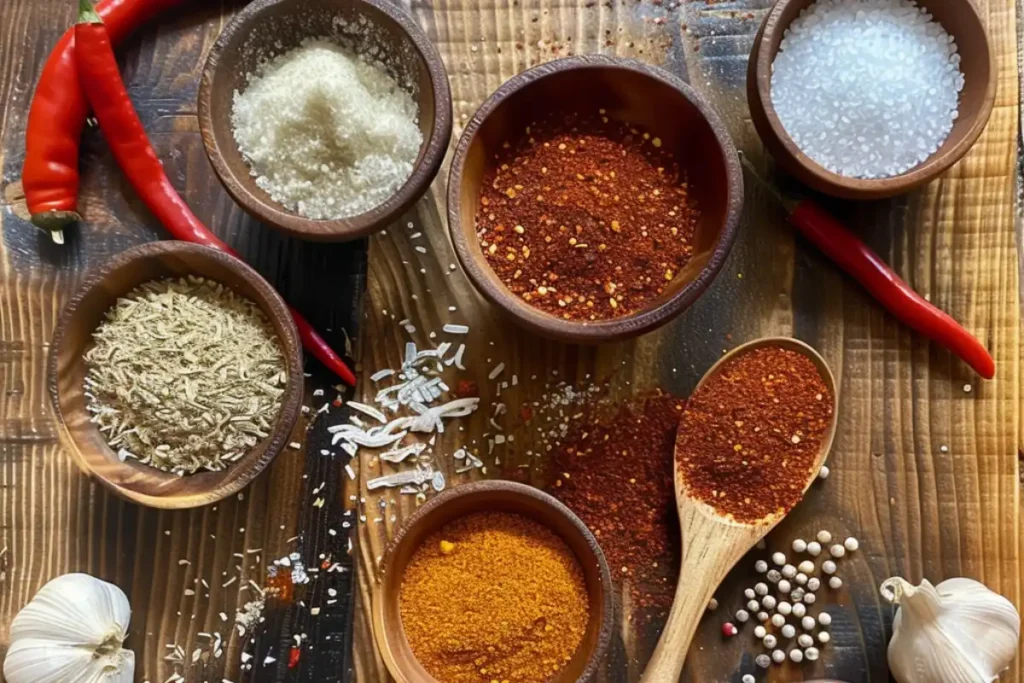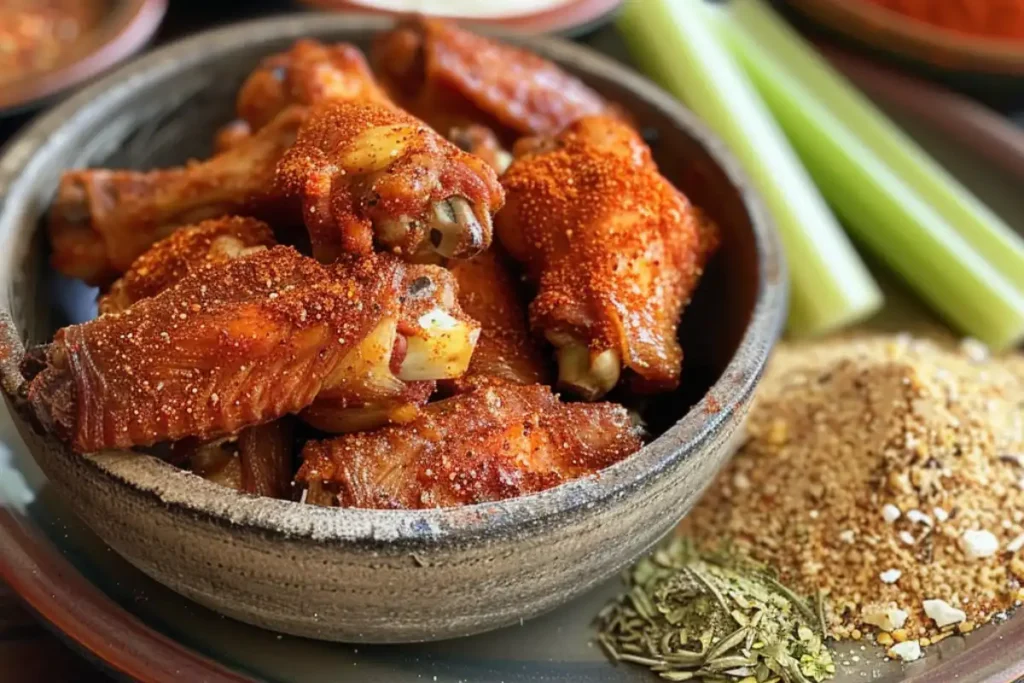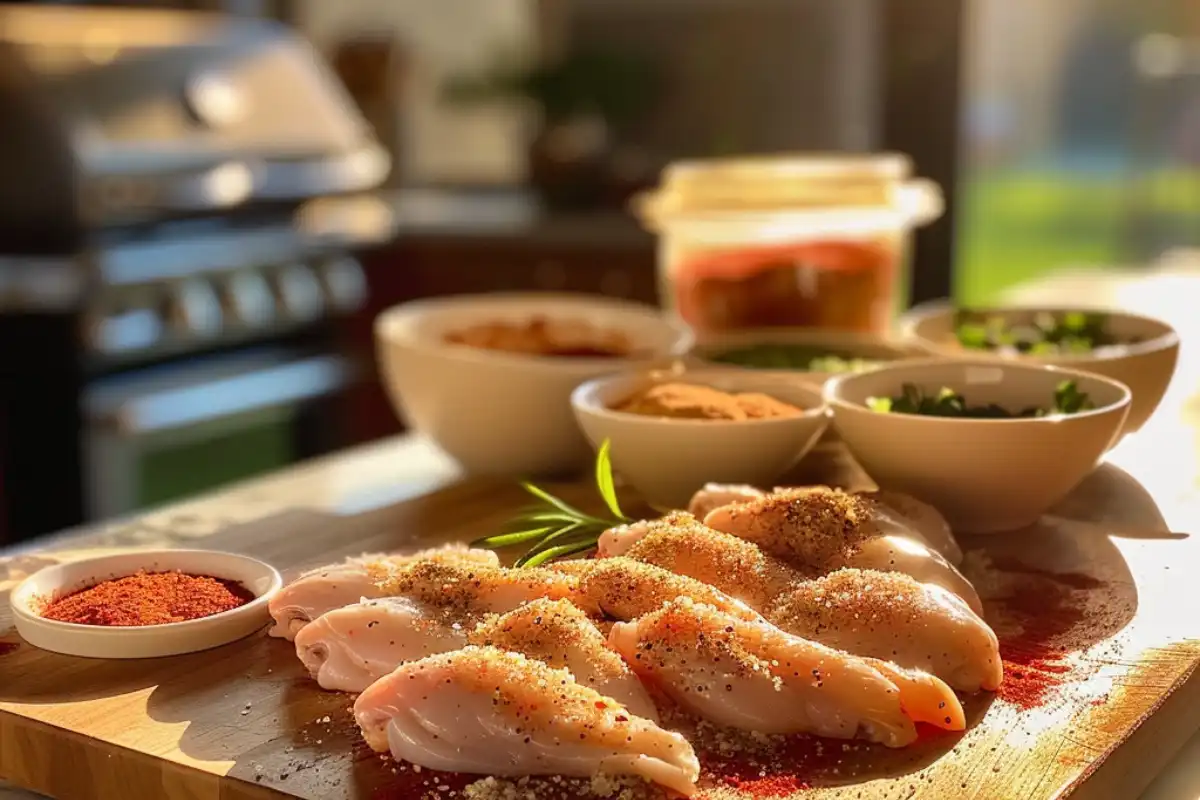Chicken wings are a popular dish worldwide, loved for their crispy skin and juicy meat. Whether served at parties, family dinners, or casual gatherings, wings can be seasoned in a variety of ways to suit any palate. One crucial step in preparing chicken wings that often sparks debate is whether to season them before cooking. In this guide, we’ll answer the question: Should you season chicken wings before cooking? We’ll dive into the science of seasoning, discuss the best spices, and explore the benefits of seasoning before and after cooking.
For wing lovers, seasoning plays a critical role in the flavor and texture of the dish. Seasoning can transform bland wings into a flavorful, crowd-pleasing meal. By the end of this article, you’ll know how to perfectly season your wings for any occasion.
Why Seasoning Chicken Wings Before Cooking Is Important
Seasoning your chicken wings before cooking is not just a suggestion—it’s essential. Seasoning ensures that flavors permeate the meat and helps create a crispy, flavorful skin when cooking. Here’s why pre-seasoning is so crucial.
The Science Behind Seasoning Meat
Seasoning meat, particularly with salt, involves more than just sprinkling spices on the surface. Salt penetrates the skin and meat, drawing out moisture while allowing the chicken to reabsorb the brine formed. This reabsorption helps the wings retain moisture, ensuring they stay juicy even when cooked at high temperatures.
Salt also breaks down muscle proteins, making the meat more tender. Seasoning before cooking enhances the flavor, allowing the spices to infuse the meat, ensuring that each bite is packed with flavor from the inside out. For a detailed look at seasoning techniques, you can explore why seasoning before cooking is important, which dives deeper into how seasoning affects meat texture and taste.

In contrast, wings that are only seasoned after cooking may have a flavorful outer coating, but the meat inside remains bland. Pre-seasoning ensures that the seasoning reaches deep into the chicken.
Different Methods of Pre-Cooking Seasoning
When it comes to seasoning chicken wings before cooking, you have several options, depending on how much time you have and the type of flavors you want to achieve. Let’s explore the three most common methods: dry rubs, marinades, and brining.
Dry Rubs
Dry rubs are a blend of dried spices and herbs that you massage into the chicken wings. They typically include paprika, cayenne pepper, garlic powder, and onion powder, but you can customize them to your taste. Dry rubs are easy to apply and don’t require much preparation. The key advantage of using a dry rub is that it helps form a flavorful crust on the outside of the wings during cooking, especially when grilling or baking.
How to Apply a Dry Rub:
- Pat the chicken wings dry with paper towels.
- Mix your chosen spices in a bowl (e.g., paprika, garlic powder, salt, pepper, and cayenne).
- Coat the wings evenly with the spice blend, making sure every wing is covered.
- Let the wings sit for at least 15-30 minutes to allow the flavors to penetrate. If you have more time, letting them rest overnight in the refrigerator will yield even better results.
You can find creative dry rub ideas in this Buffalo Wing Seasoning Recipe, which uses cayenne, paprika, and other spices to create a perfect balance of heat and flavor.
Marinades
A marinade is a liquid mixture that typically includes oil, acid (such as vinegar or citrus juice), and spices. Marinades can tenderize the chicken wings while infusing them with flavor. The acid in the marinade helps break down the proteins in the meat, making it more tender and juicy. Marinades are especially useful if you plan to grill or bake the wings.
How to Apply a Marinade:
- Mix the marinade ingredients in a bowl or plastic bag. A basic marinade might include olive oil, lemon juice, garlic, and herbs.
- Submerge the chicken wings in the marinade, making sure they are fully covered.
- Refrigerate the wings for at least 2-4 hours, but overnight is ideal for maximum flavor absorption.
- Remove the wings from the marinade and cook them as desired.
For more detailed instructions on creating flavorful marinades, you can read How to Marinate Chicken Wings.
Brining
Brining involves soaking the chicken wings in a saltwater solution, often with added sugar or spices. This technique is excellent for keeping the meat juicy, especially if you’re cooking the wings at high heat. Brining works by hydrating the meat and ensuring that the wings retain moisture during cooking.
How to Brine Chicken Wings:
- Dissolve 1/4 cup of salt in 4 cups of water (you can add sugar, herbs, or spices for extra flavor).
- Submerge the wings in the brine for 1-4 hours, depending on how much time you have.
- Rinse the wings thoroughly before cooking to remove excess salt.
The Best Spices and Seasonings for Chicken Wings
Choosing the right spices for your chicken wings is key to enhancing their flavor. Whether you want them spicy, sweet, or savory, here are some of the best seasoning options.
Essential Spices for Chicken Wings
- Salt and Pepper: Salt enhances the natural flavors of the chicken, while freshly ground black pepper adds complexity and a hint of heat. Salt is especially important for drawing out moisture from the skin, making it crisp up when baked or fried.
- Garlic Powder and Onion Powder: These spices provide a savory base flavor that pairs well with almost any seasoning blend. They are commonly found in most dry rub recipes.
- Paprika: Paprika is a must for adding a deep red color and a mildly smoky flavor. You can use sweet or smoked paprika depending on your preference. Smoked paprika, in particular, brings a BBQ-like flavor to the wings without using a smoker.
- Cayenne Pepper: If you like your wings spicy, cayenne pepper is essential. It provides heat and can be adjusted depending on how spicy you want the wings to be.
Unique Seasoning Ideas for Chicken Wings
- Buffalo Spice Blend: A blend of cayenne pepper, paprika, garlic powder, and salt makes the perfect Buffalo wing seasoning. You can find a fantastic example of this blend in the Buffalo Wing Seasoning Recipe.
- Mediterranean-Inspired Seasonings: Oregano, thyme, and rosemary are excellent herbs to use if you want a lighter, herb-forward flavor. Combining these herbs with olive oil and lemon creates a Mediterranean profile that is refreshing and aromatic.
- Asian-Inspired Seasoning: For an Asian twist, try a mix of soy sauce, ginger, garlic, and sesame oil. This seasoning blend creates a savory, slightly sweet flavor that pairs well with grilled or fried wings. Sprinkle sesame seeds on top after cooking for added texture.

For those who enjoy experimenting with bold seasonings, check out Creole Pasta for more inspiration. It’s a great example of how strong, dynamic flavors can create an unforgettable dish.
How Long Should You Season Chicken Wings Before Cooking?
Timing is key when it comes to seasoning chicken wings. How long you should let the seasoning sit on the wings depends on the method you choose and how much time you have.
Quick Seasoning (15-30 Minutes)
If you’re in a hurry, you can season your wings just 15-30 minutes before cooking. This allows enough time for the salt to start working its magic by drawing moisture out of the skin and creating a crispier texture. A quick dry rub is the best option for short time frames.
Overnight Marination
For maximum flavor, marinate or season your wings overnight. This extended period allows the flavors to fully penetrate the meat, making each bite more flavorful. Whether you’re using a dry rub or a marinade, letting the wings sit overnight will enhance their taste and texture.
Should You Season Chicken Wings After Cooking?
While seasoning before cooking is crucial for infusing flavors, seasoning after cooking can also play a role in the final taste. Post-cooking seasoning is common with sauces or glazes that are added after the wings have been fried or baked.
Post-Cooking Seasoning and Sauces
After cooking your wings, you can toss them in a sauce or add extra seasoning to enhance the flavor. Some popular options include:
- Buffalo Sauce: A classic Buffalo sauce is made from a combination of hot sauce and melted butter. Once the wings are fully cooked, toss them in the sauce to coat them evenly. You can find an excellent recipe for Buffalo-flavored wings in this Buffalo Seasoning Recipe.
- Honey Garlic Sauce: For those who prefer sweet and savory, a honey garlic sauce is a great post-cooking option. It adds a sticky sweetness that complements the crispy texture of the wings.
Finishing Touches with Garnishes
Adding garnishes to your chicken wings after cooking can elevate both the flavor and presentation. Some popular garnishes include:
- Fresh Herbs: Chopped cilantro, parsley, or chives add a fresh, aromatic note that balances the richness of the wings.
- Sesame Seeds: Toasted sesame seeds provide a nice crunch and a subtle nutty flavor, perfect for wings with an Asian-inspired seasoning.

Common Mistakes to Avoid When Seasoning Chicken Wings
Even though seasoning chicken wings is relatively simple, some common mistakes can negatively impact the flavor and texture of your wings.
Not Seasoning Evenly
One of the most common mistakes is failing to season all the wings evenly. Whether you’re using a dry rub or a marinade, make sure to coat each wing thoroughly. Tossing the wings in a large bowl with the seasoning is an easy way to ensure every wing is covered.
Using Too Much Salt
Salt is essential for flavor, but too much can overpower the dish. When using salt in a dry rub or marinade, start with a small amount and adjust to taste. Over-salting can make your wings taste overly salty, especially if they sit in the seasoning for too long.
FAQs: Should You Season Chicken Wings Before Cooking?
Should I Season Chicken Wings Before or After Cooking?
- Both! Seasoning before cooking allows the flavors to penetrate the meat, while seasoning after (with sauces or glazes) adds an extra layer of flavor and moisture.
Can I Marinate Chicken Wings Overnight?
- Yes, marinating chicken wings overnight is ideal for maximizing flavor. However, be cautious with salty marinades, as leaving them for too long can result in overly salty wings.
What Spices Go Well with Chicken Wings?
- Popular spices for chicken wings include garlic powder, paprika, cayenne pepper, cumin, and oregano. You can also try more unique seasonings like ginger, coriander, or sesame oil.
Conclusion: Why Seasoning Before Cooking Is Essential
Seasoning chicken wings before cooking is crucial for achieving flavorful, crispy wings. Whether you’re using a dry rub, marinade, or brine, seasoning allows the meat to absorb flavors while tenderizing it for a juicy, delicious final product. Experimenting with different spices and seasoning methods will help you discover the perfect combination for your taste.
Remember, seasoning after cooking can also enhance your wings, especially if you enjoy sauces or glazes. Whether you’re making classic Buffalo wings or trying a unique seasoning blend, seasoning is the key to elevating your chicken wings from good to great.
For more seasoning ideas, explore this Buffalo Wing Seasoning Recipe for a spicy twist on your next batch of wings. Happy cooking!

